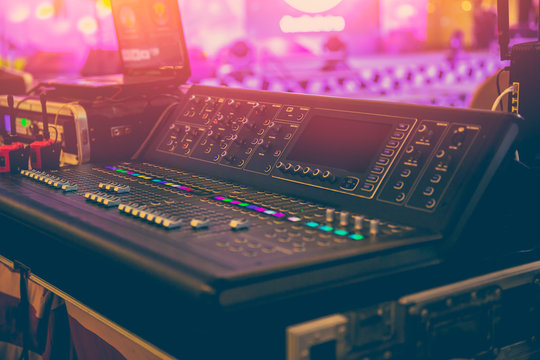Music production is an art that has been around for decades. It has evolved over the years, and with the advent of technology, it has become more accessible than ever before. While many people may have heard the term “music production,” not everyone knows exactly what it entails. In this blog post, we will be exploring the basics of music production and delving into what it really means to be a music producer. Whether you’re a seasoned musician or just starting out, understanding music production is essential to creating high-quality tracks. So, let’s dive in and explore this fascinating world!
Table of Contents

Understanding the Fundamentals: Defining Music Production
Music production is the process of creating and shaping sound into a final recorded piece. It involves everything from the initial idea to the finished product, including recording, editing, mixing and mastering. A music producer is responsible for overseeing every aspect of this process, from helping to develop the song to ensuring that it sounds its best when played on various platforms. Music production can be done in many different ways using various technologies and tools such as digital audio workstations (DAWs), recording software, effects processors, microphones, speakers and more. An excellent music producer has both technical skills and creativity needed to deliver a great sounding record with unique style whilst effectively communicating with other professionals involved in the project like musicians or mix engineers achieving their vision within budget constraints.

The Art of Creating Sound: A Beginner’s Guide to Music Production
Music production is the process of creating music from scratch or enhancing existing tracks using various techniques and tools. It involves recording, editing, mixing, and mastering audio to produce a final product that is ready for distribution. As a beginner in music production, it’s important to understand the basics of sound and how it can be manipulated to create different effects. This includes understanding frequency, amplitude, and waveforms. Additionally, having a good understanding of music theory can help in creating melodies and harmonies that work well together. Music production also involves the use of software such as digital audio workstations (DAWs) which allow for recording, editing, and mixing of audio tracks. Other important tools include microphones, headphones, and monitors which help in capturing and monitoring sound accurately. With dedication and practice, anyone can learn the art of music production and create their own unique sound.
From Concept to Creation: The Process of Music Production Explained
Music production is a complex process that involves various stages. The first step is conceptualizing the idea and creating a rough draft. This is followed by recording the tracks, editing them, and mixing them to create a final product. The process of music production requires technical skills, creativity, and attention to detail. It involves using digital audio workstations (DAWs), which are software programs that allow producers to record, edit, and mix music. Producers also use various plugins to enhance the sound quality of their tracks. Once the tracks are recorded and edited, they are mixed together to create a final product. This involves adjusting the levels of each track, adding effects such as reverb or delay, and creating a stereo image. The final step is mastering, which involves preparing the track for distribution by adjusting its overall volume and EQ balance. Overall, music production is a highly creative process that requires technical expertise and attention to detail to create high-quality tracks.
The Tools of the Trade: Essential Equipment for Music Production
When it comes to music production, having the right tools is essential. Audio interface is one of the most important pieces of equipment for any music producer. It acts as a bridge between your computer and other audio devices, allowing you to record and playback audio with high quality. Another important tool is a digital audio workstation (DAW), which is essentially a software program that allows you to create, edit, and mix music on your computer. There are many different DAWs available on the market, each with its own unique features and capabilities. Other essential equipment includes studio monitors, headphones, microphones, and MIDI controllers. It’s important to invest in high-quality equipment that will allow you to produce professional-sounding music. While it can be expensive to get started in music production, investing in the right tools will pay off in the long run.
The Importance of Music Production in Today’s Industry
Music production is a critical aspect of the music industry, and its importance cannot be overstated. With the rise of digital technology, it has become more accessible than ever to create high-quality sound recordings that can compete with those produced by major labels.
In today’s music industry, music production plays a pivotal role in shaping artistic direction and creating unique sounds that stand out from the crowd. Music producers work closely with artists to bring their creative vision to life and help them achieve commercial success.
With so much competition in the music industry, having top-notch music production skills can make all the difference for aspiring musicians and producers alike. By mastering every aspect of this art form, you can create compelling tracks that resonate with audiences around the world and set yourself apart as an elite producer in your field.
Overall, whether you are an artist looking to take your career to new heights or a producer seeking professional recognition within the industry, understanding and embracing music production is essential for achieving long-term success in today’s competitive music landscape.
In conclusion, music production is a complex and fascinating process that involves the creation and manipulation of sound to produce a final product that can be enjoyed by millions. Whether you’re a beginner or an experienced musician, understanding the fundamentals of music production is essential if you want to create high-quality music that stands out in today’s competitive industry. By mastering the basics, you’ll be able to take your creativity to new heights and produce music that truly reflects your unique style and vision.
If you’re interested in learning more about music production, be sure to check out our other content on the topic. From tutorials on specific techniques to reviews of the latest equipment, we’ve got everything you need to take your skills to the next level. So what are you waiting for? Start exploring today and see where your passion for music production can take you!
FAQ
Q.Who does music production involve?
A.Music production involves producers, engineers, and artists.
Q.What is music production?
A.Music production is the process of creating and recording music.
Q.How is music production done?
A.Music production is done through recording, mixing, and mastering.
Q.What are the benefits of music production?
A.Music production can lead to a successful career and creative fulfillment.
Q.How long does music production take?
A.Music production time varies depending on the complexity of the project.
Q.Isn’t music production expensive?
A.Music production can be expensive, but there are ways to reduce costs such as DIY production.


